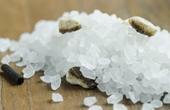Other minerals

Magnesium
Indispensable participant in the enzymatic processes that ensure the biosynthesis of proteins and the metabolism of carbohydrates. It also has a calming, vasodilating and diuretic effect, contributes to the proper maintenance of the tone of the walls of blood vessels and enhances the processes of inhibition in the cerebral cortex. The daily requirement of an adult in magnesium is 350-500 mg, with pregnancy and lactation - 1000-1200 mg;children under 3 years - 140 mg, from 4 to 6 years - 220, from 7 to 10 years - 300 and children from 11 to 13 years - 400 mg. Most magnesium contains products of vegetable origin, especially almonds, walnuts, wheat, many cereals, apricots, cabbage.
Potassium
Obligatory participant in many metabolic processes. At the same time, it closely interacts with sodium and chlorine. Important ions are potassium in maintaining the automatism of cardiac muscle contraction - the myocardium. The potassium-sodium pump provides removal of sodium ions from the cells and replacing them with potassium ions, which, in turn, is accompanied by the removal of excess fluid from the body. For such a "pump" to function rhythmically and with sufficient intensity, an adult healthy person should consume about 3.5 g of potassium daily with food. To prevent and eliminate edema, with rheumatism, to reduce excessive intestinal peristalsis, the need for it increases to 5 g per day.
Compared with other products, potassium is the most in dried apricots, figs, oranges, mandarins, potatoes, dried peaches, turnips, dog-rose, black and red currant, cowberry, strawberry, watermelon, melon, soy, alych, fresh cucumbers, Brusselscabbage, walnuts and hazelnuts, parsley greens, etc.
Sodium
Its main supplier is table salt. Now we only remind you that sodium participates in the formation of gastric juice, regulates the release of many metabolic products by the kidneys, activates a number of salivary gland and pancreatic enzymes, and provides alkaline reserves of blood plasma by more than 30%.According to the results of numerous studies, the daily requirement of an adult healthy person( in optimal working and living conditions) in sodium is 4-6 g. Lightly salted food is recommended for rheumatism, purulent processes in the lungs, obesity, diabetes, allergic conditions, bone fractures, cardiac diseasesvascular system, kidneys, pancreas, liver and bile ducts, certain stomach diseases, and also when hormonal preparations are prescribed for curative prophylactic purposes.
Phosphorus
The predominant part of it( up to 80%) is concentrated in the bone tissue. Therefore, the exchange of phosphorus, calcium and magnesium is closely related. The daily requirement of an adult healthy person ranges from 1000 to 1500 mg. The most rich in phosphorus milk, cottage cheese, cheese, white dried mushrooms, egg yolk, walnuts, many cereals( especially rice), soy flour, green peas, apricots and dried apricots raisins, beef and beef liver, rabbit meat.
Sulfur
Sulfur in the human body - an indispensable component of cells, tissue organs, enzymes, hormones, in particular insulin, the most important enzyme of the pancreas, and sulfur-containing amino acids. Quite a lot of it in the nervous, connective, bone tissue. It is believed that the daily diet of an adult healthy person should contain 4-5 g of sulfur, which is ensured by a properly organized diet, which includes meat, chicken eggs, oat and buckwheat, milk, cheeses and cabbage.
Iodine
Almost half of it in a person is in the thyroid gland, since iodine is the most important component of the hormone it produces - thyroxine. With prolonged deficiency of iodine in food, develops a goiter( thyrotoxicosis).Quite a lot of iodine contains sea kale, squid, shrimp, sea fish. It is also found in some fruits, vegetables, as well as in milk and dairy products. The daily requirement of an adult healthy person in iodine compounds is 0.1-0.2 mg. With a combined deficiency in the diet of iodine, copper, cobalt and manganese, the exchange of vitamin C is disrupted, and the number of red blood cells decreases.
Manganese
Actively affects the metabolism of proteins, carbohydrates and fats. Important is also the ability of manganese to enhance the action of insulin and maintain a certain level of cholesterol in the blood. In the presence of manganese, fats are more fully utilized by the body. Relatively rich in this microelement are cereals( primarily oatmeal), beef liver and many bakery products, which practically replenishes the daily human need for manganese - 5.0-10.0 mg.
Cobalt
Insufficient consumption of it manifests itself in some disorders of the central nervous system, anemia, loss of appetite. Cobalt is able to selectively inhibit the respiration of malignant tumor cells and, of course, their reproduction. Another specific advantage of cobalt is its ability to intensify the antimicrobial properties of penicillin 2-4 times. Most of all cobalt contains beef, grapes, radish, salad, spinach, fresh cucumber, black currant, cranberry, onions, beef liver, especially veal. In a day a person should eat 0.1-0.2 mg of cobalt with food.
Nickel
In combination with cobalt, iron, copper, it also participates in hematopoiesis processes, and on its own - in the exchange of fats, providing cells with oxygen. In certain doses, nickel activates the action of insulin. The need for nickel is fully provided by a rational diet, containing, in particular, meat, vegetables, fish, bakery products, milk, fruits and berries.
Zinc
It is a part of a number of the most important enzymes that ensure the proper course of oxidation-reduction processes and tissue respiration. The specific consequences of a prolonged lack of zinc in food are, first of all, a decrease in the function of the sex glands and the pituitary gland of the brain. To prevent this from happening, an adult healthy person should receive 10-15 mg of zinc daily, which is the most in geese, beans, peas, corn, beef, pork, chicken, fish, beef liver. There is also zinc in milk, apples, pears, plums, cherries, potatoes, cabbage, beets and carrots.
